
Introduction
Staircases are integral parts of buildings, connecting different levels and providing accessibility. However, the one-size-fits-all approach often doesn’t apply when it comes to stair platforms. The question arises: Can a stair platform be customized to fit different staircases? Let’s delve into this query to unveil the potentials and intricacies of stair platform customization.
Understanding Stair Platforms
Stair platforms, also known as landing platforms, are flat surfaces installed at intervals on a staircase. They serve multiple purposes, including providing resting points, aiding in direction changes, and enhancing safety during ascent and descent.
Benefits of Customization
Customizing stair platforms offers a plethora of benefits. From optimizing space utilization to ensuring seamless integration with architectural aesthetics, tailored solutions provide unparalleled advantages. Moreover, customized platforms enhance safety by addressing specific requirements of different staircases.
Factors Affecting Customization
Several factors influence the customization process, such as the staircase dimensions, materials used, building regulations, and design preferences. Each staircase presents unique challenges and opportunities, necessitating a thorough assessment before customization.
Methods of Customization
Customization methods vary depending on the existing staircase structure and desired outcomes. Techniques include adjusting platform dimensions, modifying materials, and integrating additional safety features like handrails or anti-slip surfaces.
Professional vs. DIY Customization
While some DIY enthusiasts may opt for self-customization, engaging professionals ensures precision and adherence to safety standards. Professional services offer expertise, access to specialized tools, and assurance of compliance with building codes.
Common Challenges and Solutions
Customization projects may encounter challenges such as uneven surfaces, structural limitations, or budget constraints. However, innovative solutions like modular platforms, adjustable components, and creative design approaches mitigate these issues effectively.
Safety Considerations
Safety remains paramount in stair platform customization. Attention to detail, adherence to safety standards, and regular inspections are crucial to prevent accidents and ensure long-term durability of customized platforms.
Case Studies
Exploring real-life examples of successful customization projects provides valuable insights into the possibilities and outcomes of tailored solutions. Case studies showcase diverse applications, innovative approaches, and positive impacts on usability and aesthetics.
Conclusion
In conclusion, the answer to the question “Can a stair platform be customized to fit different staircases?” is a resounding yes. Customization unlocks a world of possibilities, enabling seamless integration, optimal functionality, and enhanced safety in stair design. By understanding the intricacies, embracing innovative solutions, and prioritizing safety, stakeholders can embark on transformative customization journeys tailored to their unique requirements.
FAQs:
Can stair platforms be adjusted to fit curved staircases?
Yes, specialized customization techniques can adapt stair platforms to fit curved or irregular staircases seamlessly.
Is DIY customization recommended for stair platforms?
While DIY customization is possible, engaging professionals ensures precision, compliance, and safety in the customization process.
Are there any legal requirements to consider during stair platform customization?
Yes, building regulations and safety standards must be adhered to when customizing stair platforms to ensure compliance and safety.
How long does it take to customize a stair platform?
The duration of customization varies depending on factors such as complexity, dimensions, and the chosen customization method.
Can customized stair platforms enhance property value?
Yes, well-designed and functional stair platforms can contribute to the overall aesthetics and usability of a property, potentially increasing its value.
What materials are commonly used for customized stair platforms?
Materials such as wood, metal, glass, and composite materials are commonly used for stair platform customization, offering durability, aesthetics, and versatility.
